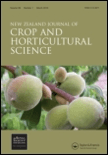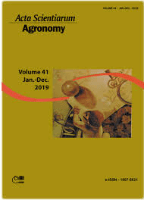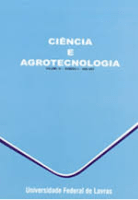
Bioagro
Scope & Guideline
Pioneering research that cultivates knowledge and sustainability.
Introduction
Aims and Scopes
- Sustainable Agriculture Practices:
Research aimed at developing and promoting sustainable agricultural techniques, such as organic farming, integrated pest management, and the use of biofertilizers. - Plant Physiology and Biochemistry:
Studies investigating the physiological and biochemical responses of plants to various environmental stresses, including drought, salinity, and nutrient availability. - Soil Science and Fertility Management:
Research focused on soil health, nutrient management, and the impact of agricultural practices on soil quality and productivity. - Crop Improvement and Genetics:
Investigations into the genetic diversity, breeding techniques, and agronomic characteristics of various crops to enhance yield and resilience. - Pest and Disease Management:
Studies exploring the interactions between crops and pests or pathogens, including biological control methods and the impact of chemical treatments. - Agroecology and Environmental Interactions:
Research that examines the ecological principles applied to agricultural systems, emphasizing biodiversity, ecosystem services, and the impact of agriculture on the environment.
Trending and Emerging
- Utilization of Organic Wastes:
Recent publications emphasize the characterization and application of organic wastes as components in agricultural substrates, highlighting sustainable practices in waste management. - Impact of Soil Microorganisms:
There is a growing focus on the role of soil microorganisms, particularly arbuscular mycorrhizal fungi and beneficial bacteria, in promoting plant growth and enhancing soil fertility. - Climate Resilience in Crops:
Research addressing the impact of climate variables on crop performance and strategies for improving resilience to drought, salinity, and other stressors is increasingly prevalent. - Nutraceutical Quality of Crops:
Emerging studies are investigating the nutraceutical properties of various crops, linking agricultural practices with health outcomes and consumer preferences. - Genetic Diversity and Crop Improvement:
A trend towards exploring genetic diversity and employing molecular techniques for crop improvement is evident, reflecting advancements in biotechnology and genomics. - Agroecological Approaches:
There is a noticeable increase in research applying agroecological principles, focusing on biodiversity, ecosystem services, and sustainable land use practices.
Declining or Waning
- Traditional Pest Control Methods:
There has been a noticeable reduction in studies focused solely on chemical pest control methods, reflecting a broader trend towards integrated pest management and biological control. - Conventional Crop Cultivation Practices:
Research centered on conventional agricultural practices, such as monoculture cropping systems, is becoming less prominent as the journal increasingly emphasizes sustainable and organic practices. - Soil Degradation Studies:
While still relevant, there is a decline in the frequency of publications specifically addressing soil degradation, possibly due to a shift towards more proactive approaches in soil management. - Single-Crop Research:
There is a waning interest in studies focusing exclusively on single crops, as interdisciplinary approaches and crop intercropping strategies gain more attention.
Similar Journals

Zemdirbyste-Agriculture
Exploring cutting-edge research in agricultural sciences.Zemdirbyste-Agriculture is a prominent journal dedicated to advancing the field of agricultural sciences, with a particular focus on agronomy and crop science. Published by the Lithuanian Research Centre Agriculture & Forestry, this open access journal has been fostering knowledge sharing and scientific discourse since 2004, allowing researchers, professionals, and students unrestricted access to its content. Located in the beautiful country of Lithuania, specifically at Vytautas Magnus University, this journal plays a significant role in disseminating innovative research findings. With a 2023 Scopus ranking of #246 out of 406 in the category of Agricultural and Biological Sciences, Zemdirbyste-Agriculture falls within the Q3 quartile, reflecting its growing influence in the academic community. This journal, which has converged its publication focus from 2008 to 2023, aims to provide a platform for scientists to share their critical insights on agricultural practices, sustainability, and technological advancements in crop science, thereby contributing to the global discourse on food security and environmental health.

Romanian Agricultural Research
Nurturing Innovations in Agronomy and Crop ScienceRomanian Agricultural Research is a prominent academic journal dedicated to advancing the field of agricultural science with a specific focus on agronomy and crop management. Published by the NATL AGRICULTURAL RESEARCH & DEVELOPMENT INST in Romania, this journal has established itself as an important resource within its discipline, evidenced by its Q3 ranking in the Agronomy and Crop Science category for 2023. With its ongoing publication since 2008, the journal provides a platform for researchers and professionals to disseminate their findings and share innovative practices that address the challenges faced in agricultural development. Although it operates under a non-open access model, Romanian Agricultural Research commits to rigorous peer-review processes, ensuring the high-quality content that enhances the academic community’s knowledge base. The journal's objective is to foster dialogues surrounding sustainable agriculture, improve crop yield, and contribute to the enhancement of agricultural practices globally. Researchers, professionals, and students will find this journal to be an invaluable repository of knowledge and a catalyst for future agricultural innovations.

Plant Science Today
Cultivating insights in the world of plant biology.Plant Science Today is a prominent journal dedicated to advancing the field of plant sciences through innovative research and comprehensive reviews. Published by HORIZON E-PUBLISHING GROUP in India, this open-access journal has been actively disseminating knowledge since its inception in 2018, with a convergence period extending to 2024. With an ISSN of 2348-1900 and a growing reputation, it is categorized in various quartiles for 2023, notably achieving Q3 in Biochemistry, Genetics and Molecular Biology (miscellaneous), while it holds Q4 rankings in critical fields including Ecology and Plant Science. As a valuable resource for students, researchers, and professionals, Plant Science Today aims to inspire discussion and innovation in the realm of ecological and plant science disciplines, where it currently ranks within the lower percentiles in prominent categories such as Environmental Science and Agricultural and Biological Sciences. The journal serves as a crucial platform for the exploration of experimental and theoretical advances, fostering a community eager to explore plant biology's complexities.

Agronomy-Basel
Transforming Agricultural Science with Impactful DiscoveriesAgronomy-Basel is a leading international journal dedicated to advancing the field of agronomy and crop science, published by the respected MDPI. Since its inception in 2011, this open-access journal has provided a vital platform for the dissemination of high-quality research, featuring innovative studies and reviews that contribute to the understanding of agricultural practices and crop management. With an impressive impact factor and ranked in the Q1 quartile of its category for 2023, Agronomy-Basel has established itself as a premier resource in the realm of Agricultural and Biological Sciences, achieving a commendable rank of #62 out of 406 in its field, placing it in the 84th percentile. The journal targets researchers, professionals, and students who are dedicated to enhancing agricultural sustainability and productivity. Located in Basel, Switzerland, the journal's commitment to open access empowers global accessibility to flourishing agricultural advancements, thus fostering collaboration and innovation across the globe.

NEW ZEALAND JOURNAL OF CROP AND HORTICULTURAL SCIENCE
Pioneering Research for Tomorrow's Agricultural ChallengesThe New Zealand Journal of Crop and Horticultural Science, published by Taylor & Francis Ltd, stands as a key resource in the fields of Agronomy and Horticulture, with a commendable impact factor reflecting its quality and influence in the scientific community. Since its inception in 1989, this journal has been committed to advancing our understanding of crop development and horticultural practices, catering not only to researchers and professionals but also to students eager to delve into the intricacies of plant sciences. With a Q3 ranking in both Agronomy and Crop Science and Horticulture as of 2023, the journal occupies a significant position within the agricultural and biological sciences domain, significantly contributing to the body of knowledge in these fields. The journal features original research, reviews, and technical notes that cover a wide range of topics, ensuring a comprehensive perspective on contemporary and emerging agricultural issues. For individuals interested in accessing cutting-edge research, the journal provides subscription-based access, further enhancing its scholarly contributions.

ACTA SCIENTIARUM-AGRONOMY
Connecting researchers to the pulse of agricultural innovation.ACTA SCIENTIARUM-AGRONOMY is a prestigious, peer-reviewed journal published by UNIV ESTADUAL MARINGA, PRO-REITORIA PESQUISA POS-GRADUACAO, focusing on advanced research in the field of agronomy and crop science. Since its inception as an Open Access journal in 2007, it has significantly contributed to disseminating high-quality research, allowing unrestricted access to its content for a global audience. Operating from Brazil, the journal holds a notable Q2 category ranking in Agronomy and Crop Science as of 2023, validating its importance within the academic community. The journal’s Scopus ranking positions it in the 49th percentile among Agricultural and Biological Sciences, indicating a robust foundation for impactful research. With a commitment to innovation and scientific excellence, ACTA SCIENTIARUM-AGRONOMY aims to provide researchers, professionals, and students with vital insights that drive forward our understanding of agriculture and its environmental implications.

INDIAN JOURNAL OF AGRICULTURAL SCIENCES
Fostering collaboration for sustainable agricultural practices.Welcome to the Indian Journal of Agricultural Sciences, a vital resource for researchers and professionals in the field of agricultural sciences, published by the esteemed Indian Council of Agricultural Research. Established in 1974, this journal aims to disseminate high-quality research and developments in agronomy and crop science, facilitating knowledge exchange and advancement within the agricultural community. Though currently classified in the Q4 category according to 2023 data, it provides an essential platform for publication, contributing valuable insights towards sustainable agricultural practices. With an ISSN of 0019-5022 and an E-ISSN of 2394-3319, the journal houses important research that spans decades of convergence and collaboration, promoting innovation in agriculture across India and beyond. As an open access platform, it invites contributions that reflect a wide array of agricultural disciplines to foster sustainable food systems that address the challenges of food security. Join the network of scholars and practitioners by sharing your research and engaging with the profound work being done in this transformative field.

CIENCIA E AGROTECNOLOGIA
Driving Excellence in Agricultural Research and TechnologyCIENCIA E AGROTECNOLOGIA, published by UNIV FEDERAL LAVRAS-UFLA, is a vital open-access journal since 2005 that serves as an influential platform for disseminating research in the fields of Agronomy, Animal Science, Food Science, Soil Science, and Veterinary Science. With its ISSN 1413-7054 and E-ISSN 1981-1829, this journal is recognized for its contribution to science and technology advancements in agriculture, particularly in Brazil, fostering knowledge exchange among researchers, professionals, and students. Currently ranked in the Q2 quartile for Agronomy and Crop Science, Animal Science and Zoology, and in the Q3 quartile for Food Science and Soil Science, it demonstrates a solid international standing in the relevant Scopus indices. The journal's commitment to open access ensures that critical research findings are freely available, enabling a broader impact and encouraging collaborative advancements in agritech. As the journal looks towards its converged years from 2007 to 2024, it continues to uphold its objectives of promoting sustainable practices and innovation within the agricultural sciences.

SCIENTIA AGRICOLA
Cultivating insights for a thriving agricultural landscape.SCIENTIA AGRICOLA is a prestigious, peer-reviewed journal published by UNIV SAO PAULO, ESALQ, dedicated to advancing the field of agricultural sciences. With the ISSN 1678-992X and an e-ISSN maintaining the same number, this Open Access journal has been a valuable resource since 1992, fostering wide dissemination of knowledge and research findings in agriculture. Hailing from Piracicaba, Brazil, associated with one of the leading agricultural universities, SCIENTIA AGRICOLA serves as an essential platform for researchers, practitioners, and students aiming to explore innovative agricultural practices, crop production, and sustainable techniques. Although specific metrics such as H-Index and Scopus Ranks were not provided, the journal's longstanding commitment to open access and impactful research underscores its importance in contributing to the global dialogue on agricultural efficiency and sustainability.

ACTA AGROBOTANICA
Fostering discovery in the world of plants and ecosystems.ACTA AGROBOTANICA, published by Polskie Towarzystwo Botaniczne, serves as a premier open-access journal in the fields of Agronomy, Ecology, and Plant Sciences. Established in 1953, this journal presents a rich history of scholarly contributions, showcasing significant research findings and advances within the botanical domain. Operating under an Open Access model since its inception, ACTA AGROBOTANICA fosters accessibility and dissemination of knowledge, crucial for researchers, professionals, and students alike. The journal currently holds a respectable Q3 ranking in prominent categories such as Agronomy and Crop Science, Ecology, Evolution, Behavior and Systematics, and Plant Science as of 2023, reflecting its growing impact within the scientific community. With a dedication to exploring diverse botanical issues in Poland and beyond, this journal remains a valuable platform for innovative research and critical discourse in botany.